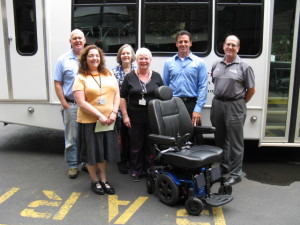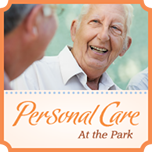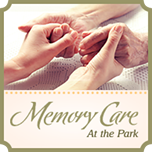
(From left to right) Kevin Smith, Maintenance Assistant; Miranda Wagner, Assistant Administrator; Donna Marie Saul, Director of Education and Resident Services; Elizabeth Williams, Community Administrator; Dan Clower, Sunrise Medical Account Manager; Joe Vanleer, Delcrest Medical Services Sales Associate
Understanding Hearing Loss in Older Adults
Hearing loss, also known as Presbycusis, is the gradual loss of hearing that often comes with aging. It is among the most common conditions that affect older adults. Experiencing hearing impairment can complicate understanding and adhering to medical guidance, responding to alerts, and hearing essential sounds such as phones, doorbells, and any type of alarms.
The effects of hearing loss go beyond simply struggling to hear the world around you. Older adults who neglect to treat their hearing loss may experience feelings of loneliness, frustration, and depression. Untreated hearing loss has also been linked to cognitive decline and an increased risk for dementia.
Many things can influence our hearing abilities as we get older. For instance, changes in the inner ear and the nerve pathway from the ear to the brain are common culprits. Exposure to loud noises over a lifetime, certain medical conditions like diabetes or high blood pressure, and specific genetics can also predispose people to hearing loss.
Do you or a loved one feel like you may be experiencing age-related hearing loss? Think about the following questions:
- Is it difficult to understand conversations, especially in noisy environments?
- Do you frequently ask others to repeat themselves during conversations?
- Are you turning up the volume on your devices, such as the TV or radio, louder than usual?
- Are you having trouble hearing high-pitched noises, such as doorbells or the phone ringing?
- Have family or friends expressed concern about your hearing?
If you or a loved one answers yes to any of the above, here are simple strategies to cope with hearing loss and its challenges.
Regular Hearing Screenings: Older adults need to have their hearing checked regularly to catch any changes that may be affecting them. Discovering issues early on means they have the option to take preventive measures and receive treatment sooner. Taking such a simple yet proactive step can significantly improve their hearing abilities and overall quality of life.
Hearing Aids: Hearing aids are special devices that make sounds louder to improve hearing. Nowadays, they’re made to be small, unnoticeable, and fit comfortably, making them great choices for older adults with hearing loss. Older adults or their loved ones need to chat with their doctor about picking out hearing aids that are best for their specific needs.
Assistive Listening Devices (ALDs): ALDs work alongside hearing aids to improve sound quality in certain situations. These devices, such as amplified telephones, TV systems, and personal amplifiers, are especially handy in noisy environments. They can significantly improve communication and overall hearing experience for those in challenging listening conditions.
Communication Techniques: Older adults can benefit from discovering practical and effective ways to communicate and help them engage in conversations in a way that feels more manageable. Approaches such as maintaining eye contact, minimizing background noise, and speaking clearly when engaging with them can reduce any potential hearing-related communication challenges. These easy techniques foster smoother interactions and stronger connections with others.
Visual Aids: Incorporating visual aids such as lip-reading or sign language can be beneficial during conversations, helping your loved one to comprehend. Using these cues not only enhances understanding but also promotes more meaningful conversation. By embracing this approach, older adults will always feel included and engaged in discussions, strengthening bonds, and enriching social interactions. It’s another simple yet powerful way to ensure everyone feels valued and heard despite the challenges they may be experiencing.
Encourage Healthy Habits: Everything your body consumes makes an impact. Lifestyle choices like smoking, excessive alcohol consumption, prolonged headphone use, and lack of physical activity can contribute to hearing loss over time. Supporting your loved one by including manageable exercise into their routine, enriching their diet with nutritious foods, and ensuring proper sleep can positively impact their hearing health.
While these valuable tips aim to ease many hearing difficulties you or a loved one may be facing, it’s important to always seek guidance from a doctor or healthcare professional to ensure you’re on the right path. No matter what changes you may be experiencing, Gloria Dei’s Personal Care and Memory Care at The Park Communities are always here to assist you and your loved one in providing the essential care needed. Visit our website to find out more today!
As you age, keeping your brain sharp becomes essential for staying healthy and leading a happy and fulfilling life. Your brain may experience changes over time, so it’s crucial to focus on the best practices that keep your mind sharp. Some brain-boosting activities that typically come to mind may have questionable effects that are sneaking up on you. It’s essential to understand the habits that could be tiring your mind and swap them out of your routine for more beneficial practices.
1. Mindfulness Multitasking
Although multitasking might appear to enhance productivity and fulfillment, it can hinder cognitive abilities, especially with age. Constantly shifting between tasks can result in lowered concentration, heightened stress, and decreased efficiency. Rather than trying to juggle multiple things at once and overexert yourself, dedicate your attention to one task at a time. This approach will allow your brain to fully engage and perform more effectively.
2. Lack of Sleep
Getting a quality night of rest is always essential, no matter what chapter of life you are in. With that in mind, another aspect of aging is commonly experiencing disruptions in sleep patterns and habits. Sleep impacts not just mood and energy levels but also affects memory retention and focus. Creating a regular sleep schedule, fostering a tranquil sleep environment, and staying away from stimulants like caffeine and electronics before bedtime are simple tricks to enhance your sleep quality.
3. Inactive Lifestyle
Physical activity doesn’t just benefit your body – it’s also a boost for brain health. Leading a life without physical activity can cause cognitive decline, diminish mental sharpness, and heighten the likelihood of conditions such as dementia. Introducing regular exercise into your routine, even though low-impact activities like walking or swimming, can improve blood flow to the brain and enhance its function.
4. Excessive Screen Time
Although technology has its perks when it comes to finding ways to relax, spending too much time staring at screens can harm brain health. Excessive screen time can cause eye strain, shorten attention spans, and alter sleep patterns. Cutting back on-screen time, taking regular breaks, and doing activities without screens, like reading, writing, or doing a puzzle, can help ease these potential problems.
5. Unhealthy Eating
A diet filled with processed foods, sugar, and unhealthy fats hurts both the body and how the brain performs. Eating nutritious foods like fruits, veggies, whole grains, and healthy fats gives your brain the vitamins and antioxidants it needs to stay healthy. Plus, staying hydrated is essential for your brain’s function, as it helps your cells communicate and clears out toxins. Looking to learn more about what healthy habits you can add to your diet? Check out Heart-Healthy Eats: Elevate Your Nutrition!
6. Long-term Stress
While experiencing stress is normal at times, having ongoing heightened emotions can disrupt your brain. It can cause memory issues, making it difficult to make decisions and increase your chances of having mental health challenges. When you invest time into finding and practicing ways to cope, like mindfulness, meditation, yoga, or simply enjoying the fresh air, it can help lower stress and make your brain stronger.
7. Social Isolation
Everybody enjoys having time to themselves to decompress. Though alone time is necessary to feel relaxed, too much of it can lead to feelings of isolation. Especially with age, having friends or family to connect with becomes more important to uphold your mind’s well-being and keep your moods stable. Being isolated or feeling lonely can create feelings of depression and cause other health issues to arise. Penciling in time for friends, joining clubs, volunteering, or just keeping in touch with those close to you can give you the support your brain needs.
Transitioning to a personal care and memory care community represents a significant change. Whether the decision is for you or a loved one, it’s common to experience a range of emotions, from anticipation to concern. Knowing what to expect and getting some helpful advice can make this transition easier and more comfortable, leading to a positive change.
What to Expect
Welcoming Atmosphere
- Personal care and memory care communities prioritize fostering a welcoming and comfortable atmosphere. Upon arrival, anticipate being warmly welcomed by dedicated staff members who are committed to delivering the compassionate care you or a loved one have been looking for. Communities strive to make sure that residents and their families feel valued, supported, and at ease in this new environment.
Individualized Care Plans
- New residents undergo a thorough assessment aimed at identifying their unique needs and preferences. These assessments are the foundation for crafting individualized care plans that cater to each person’s specific requirements. By carefully considering factors such as medical history, lifestyle preferences, and personal goals, the staff and healthcare providers ensure that all residents receive the personalized care and support they need. These plans are continuously reviewed and adjusted as needed to accommodate changes in the resident’s condition or preferences.
Supportive Staff
- Professionally trained staff and medical professionals are hands-on 24/7 to assist with daily activities, oversee medication distribution, and address any concerns that may arise. Their dedication is unwavering in protecting the safety and overall well-being of every resident. Residents can rest assured knowing that a compassionate team is readily available no matter the need.
Engaging Activities
- Communities provide engaging activities and programs to give residents opportunities for social interaction, exercise cognitive abilities, and cultivate health and happiness. Whether it’s participating in group activities or exploring artistic endeavors through crafts, residents can stay active and engaged. These activities not only stimulate the mind and body but also encourage meaningful connections. With many options available, there’s something to suit all individual’s abilities and interests.
Tips for Making the Move
- Plan Ahead – Start planning for the move as early as possible to make it less stressful and ensure everything goes smoothly. Make a list of things to do before and after the move, like sorting your stuff, arranging transportation, and notifying friends and family.
- Open Communication – Keep the conversation open and honest with community staff and healthcare professionals to address any questions or concerns you or your loved one may have. They are there to help you and offer valuable guidance throughout this process.
- Personalize Your Space – Make you or your loved one feel cozy by bringing special mementos, like photos, decorations, and familiar items. Having familiar things around can make it easier to adjust and feel at home.
- Stay Connected – If you are a new resident, stay in touch with friends and family as you go through this change. As a person in the resident’s close circle, plan visits or phone calls to chat and stay close. This helps all get support from the people they care about.
- Self-Care – Transitioning to a personal care or memory care community can be overwhelming, so it’s important to focus on looking after yourself or a loved one. Remember that it’s okay to do things at one’s own pace and reach out for help when needed.
As we get older, we tend to pay more attention to our health. We start to consider how aging is impacting us and what it might mean for the future. Whether you feel like you’re at your peak condition or could use some fine-tuning, it is always a good time to prioritize your health. With that said, have you ever heard of holistic wellness? By learning and practicing this approach, you can take the extra step to ensure you lead the best lifestyle possible.
Your health goes beyond taking medication, doctor visits, or venturing to the gym. Though these things are just as beneficial and necessary at times, exploring holistic wellness looks at your health from every angle. It is an approach that understands how your mind and body work together. Your needs, aspirations, sense of belonging, and how you perceive your health are all taken into consideration.
It’s more than just fixing surface-level physical health symptoms. The holistic approach finds harmony in all aspects of life, using practices like mindfulness, social connectivity, exercise, and relaxation. No matter where your health currently stands, embracing holistic wellness can empower you to manage your well-being and thrive in a balanced and fulfilling life.
Let’s Discover the 5 Pillars That Make Up Holistic Wellness!
1. Physical Wellness
Though holistic wellness goes beyond physical activity, keeping track of your activity levels and taking steps to strengthen and care for your body is still an essential part. Developing positive physical health habits can reduce stress, reduce disease risk, and boost your energy levels every day!
Keep in mind when we talk about “physical wellness,” exercise often comes to mind first. It’s indeed a crucial part of staying healthy, but it’s not the only thing to focus on. Your body requires more than just physical activity; getting enough sleep, maintaining good hygiene, and healthy eating must be prioritized.
2. Emotional Wellness
Your emotional health entails how your feelings can affect how you handle stress, adapt to change, and carry out daily activities, among other things. How you react to different or existing experiences, especially when you enter a new chapter of life, can change over time.
Being emotionally balanced means understanding what you’re feeling and learning how to cope when faced with challenges or heightened emotions. Maintaining a positive mental health standing allows you to handle tricky situations with ease and feel supported while doing so. Always remember that it’s still okay to have a bad day. Allow yourself to feel your emotions and work through them at your own pace.
3. Social Wellness
While it’s always important to have time to yourself, cultivating strong, caring connections with the people in your life holds just as great of a significance. Social wellness goes hand in hand with emotional well-being. Your personal relationships are what keep you feeling positive and motivated, as they shape how you perceive all of life’s situations.
Having a sense of belonging is what social wellness is all about. Whether you’re involved in groups or organizations, take the initiative to spend time with loved ones, or simply feel connected to others in some way, it’s all part of living a healthy life.
4. Intellectual Wellness
Keeping your mind active helps boost how your brain works. Learning new things that excite and challenge you can continue to encourage you to expand your knowledge and skills no matter what stage of life you’re in. You can keep your brain sharp in different ways, like playing games, having a deep conversation, or looking into subjects that pique your interest.
By actively engaging in avenues for learning and discovery, you foster a vibrant intellectual life. Not only will this bring you fulfillment and satisfaction, but like social wellness, it also enhances your overall sense of purpose and achievement.
5. Environmental Wellness
Think about the community you surround yourself with and where or how you spend your time. Environmental wellness consists of a give-and-take relationship between you and your surroundings. How do you contribute to your surroundings, and how does your environment, in turn, support your health and safety?
Improving your environmental wellness benefits you personally and your community. When you take care of and appreciate your natural surroundings and the positive impact it has to offer, they can better support and take care of you so life can run smoothly.
Wellness means something different for everyone. Feeling healthy can help everyone reach personal goals. When you care for your mind and body together, it’s easier to feel fulfilled and overcome the obstacles you face. Here are a few simple tips for practicing holistic wellness to enrich your life every day:
Make Self-Care a Priority: Dedicate time each day to nourish your mind and body by engaging in activities that bring you joy and relaxation. Reading, journaling, and setting goals and priorities for yourself are small steps that can have a big impact. Doing so can help you be more self-aware of your emotions, too.
Stay Active: Incorporating regular physical activity into your daily routine promotes physical health and mobility and enhances mental well-being and liveliness. Go for a brisk walk, head to the gym, and take in the fresh air.
Healthy Eating: Nourish your body with a balanced diet and essential nutrients to support your mind and body. Choose foods rich in nutrients and antioxidants, such as fruits and veggies, to support mental clarity and emotional balance.
Foster Social Connections: Maintain meaningful relationships with friends, family, and your community to alleviate feelings of isolation or loneliness. When we engage with others, it promotes a greater sense of belonging and instills purpose within ourselves. Join in on community activities to give back to the place that supports you.
Practice Mindfulness: Carve out moments in your day to immerse yourself in the present, creating a deep sense of awareness and connection to the world around you. By regularly practicing mindfulness, you can cultivate inner peace and reduce stress.
Did you know that heart disease affects about one-third of the population? High blood pressure, cholesterol levels, and inflammation are all risk factors that threaten heart health. There are effortless ways to reduce potential risks, and including superfoods into your diet is one of them.
Adding more nutritional value to your life never hurts anyone. There are a handful of foods that promote healthy living. With February being National Heart Month, celebrate by considering adding the following foods into a daily diet!
Greens and Vegetables
Vitamins, minerals, and antioxidants are found in greens and vegetables. They protect cells and slow down plaque buildup. This is essential for reducing bad cholesterol within the arteries. Having spinach, kale, broccoli, and cabbage, is especially beneficial because they provide vitamin K. Vitamin K keeps arteries clear and reduces excessive blood clotting. Without this protection, the heart won’t receive the necessary blood flow. Also found in greens and vegetables, vitamin A is an additional source of antioxidants. Carrots, sweet potatoes, and peppers are some of the most common.
Berries
Full of nutrients, berries have the power to lower cholesterol and blood pressure too. They can eliminate inflammation around the heart. Like leafy greens and vegetables, berries are packed with antioxidants. If you’re looking to get specific, eating blueberries once a day improves the cells within blood vessels. As mentioned, this is vital to prevent high blood pressure and clotting.
Fish
Consuming fish provides the body with omega-3. These fatty acids reduce triglycerides, a type of fat in the bloodstream that can lead to plaque buildup and an irregular heartbeat. Salmon, mackerel, and tuna are easy omega-3-filled fish that are easy to prepare and help keep the arteries clear. Fish oil capsules can get the job done if consuming seafood isn’t preferred. A daily omega-3 supplement has the same benefits and can be more convenient. Other omega-3 supplements, such as krill or algal oil, are similar alternatives.
Walnuts & Almonds
Aside from being a great source of fiber and micronutrients, walnuts have been proven to prevent cardiovascular disease. Including just a few servings of this snack can go a long way.
Despite belonging to different food groups, walnuts contain omega-3, just like fish. Regularly eating walnuts can decrease LDL, otherwise known as bad cholesterol, and limit artery blockage.
Almonds are notorious for having a variety of vitamins that are good for the heart. Made up of fats and fibers, there are similar benefits to eating almonds found in the food groups previously mentioned. Aside from promoting a healthy cardiovascular system and reducing blood pressure, almonds can help with weight loss due to how filling one serving can be. Be wary of excessive weight gain, as it can contribute to fatty material building up in the arteries.
Dark Chocolate
Usually considered a guilty pleasure, snacking on dark chocolate is another food that helps the heart stay healthy. Dark chocolate has natural anti-inflammatory compounds called flavonoids. They are another source of antioxidants and contain anti-inflammatory properties, thus linked to preventing cardiovascular issues. Enjoying a little here and there can’t hurt. With that in mind, be aware of factors such as high sugar and caloric intake.
Personal Care and Memory Care Communities prioritize healthy living. Our communities include three meal dining services with healthy options that encourage well-being. Residents can enjoy nutritious meals in a restaurant-style atmosphere, making it easy and enjoyable to promote a healthy heart. Visit the Personal Care and Memory Care websites to discover more about our care services and amenities.
Exercise is always good for you no matter what the circumstance is. Whether you’re trying to get in better shape, enhance your mental well-being, or just looking for a new hobby to pick up, the benefits are endless! One of the main advantages of being physically active is that it helps to lower cholesterol. Often linked to cardiovascular disease, having high cholesterol can pose a threat to many.
Depending on your lifestyle and personal fitness goals, there are plenty of ways to get your daily dose of activity no matter what your capabilities are. Are you ready to start your heart-healthy journey and let high cholesterol become one less thing to worry about? Check out these simple exercises and healthy habits you can start today!
Cardio Makes Every Beat Count!
Though cardio may not be for everyone, realizing that it’s more than just running can help you become more of a fan. Yes, running and jogging are two of the most common exercises that lower cholesterol, but keep in mind that this workout isn’t necessarily a race. Believe it or not, brisk walking can have more benefits than sprinting to the theoretical finish line. It’s easier on the body, as it puts less strain on your joints.
How good are your dance moves? This endurance-filled activity has also been discovered to improve your heart health! It increases the strength of your cardiovascular system because it gets your heart rate going and elevates your breathing. Getting your heartbeat moving faster helps your body receive more oxygen, burn calories, and lower your cholesterol. Find a local Zumba class, choose a dance partner, or fly solo, and hop to it!
Bike Your Way to Wellness
Heading out for a bike ride is an easy breezy way to improve your cholesterol. Just like enjoying a walk, bike rides are also easy on the body. With age, we can become more prone to arthritis, a common condition that affects overall mobility, especially in the knees and hips. Going for a relaxing bike ride stimulates your heart, lungs, and circulation, lowering the risk of cardiovascular disease.
Bike riding also benefits the body’s circulatory system, which has a direct relationship with your cholesterol levels. If there is too much cholesterol in your bloodstream, it can cause blockage and reduced blood flow. Spending 20 simple minutes on a bike can limit such risks, let you take in fresh air, soak up the sun, and help you lead a healthier lifestyle.
Just Keep Swimming
Swimming is a fantastic full-body workout that offers a handful of benefits, one of them being its positive impact on cholesterol levels. The combination of aerobic movements and resistance training improves cardiovascular health by increasing high-density lipoprotein (HDL) cholesterol, more simply known as “good” cholesterol. Also, swimming burns calories and weight gain, both of which play a role in managing your levels. Being a low-impact exercise, it’s accessible and manageable for all fitness levels.
Being in the water is like having natural resistance, challenging your muscle groups, and bettering strength and endurance. This fitness approach supports cardiovascular health and has positive effects on your lipid profile, leading to a healthier cholesterol balance. Doing laps in the pool, exploring an aerobics class, or going for a leisurely swim goes a long way. Such a simple activity is not only enjoyable but very effective.
Strengthening Your Way to Wellness
Building body strength is a great strategy in your quest to lower cholesterol and promote cardiovascular health. It’s the quickest way to knock levels of low-density lipoprotein (LDL), AKA the “bad” cholesterol out of your system. As you challenge your muscles, the body becomes better at using cholesterol for energy.
When it comes to weightlifting, no need to push your limits. Remember that starting small is still beneficial as you work your way up the fitness totem pole. This workout is different for everybody and adaptable to all needs. Take it easy and build your strength as you go. Setting fitness goals is a great way to prioritize your heart health and feel accomplished along the way.
Strike A Yoga Pose
In addition to improving flexibility and strength, yoga focuses on deep breathing and relaxation, keeping stress levels low. High-stress patterns and frequent distress can hurt your heart, as it causes inflammation. Inflammation around the heart can be associated with an increased risk of cardiovascular disease and the lining of the blood vessels. It ultimately balances out the good and bad cholesterol. Remember, physical activity doesn’t have to be rigorous or push your limits to get positive results in return.
It’s never too late to take control of your health and well-being. Engaging in physical activity can sometimes take patience, especially when it comes to achieving your goals. Start slow and gradually adjust. Make it a point to get up and move around every day, no matter where you are or how much time you have. Our communities encourage residents to prioritize their health. Discover the many amenities within Gloria Dei’s 55+ Active Living Communities that allow residents to lead a happier and healthier lifestyle.
After 25 years, our own Peggy Mueller has decided to retire from the Gloria Dei Communities family. Peggy has been the welcoming and familiar face greeting families and residents at Personal Care and Memory Care at the Park for many years and most recently at The Pathways at Warrington since its opening. She worked hand-in-hand as Administrative Assistant to Michele DiVincenzo during her entire tenure with Gloria Dei and was an invaluable and much-loved member of our family all those years.
We wish Peggy all the very best of life in retirement and she will be truly missed by everyone here at Gloria Dei Communities.
Getting a quality night of sleep is just as important for your overall well-being as physical activity and healthy eating. Sleep is a necessity. It helps us unwind, reduce stress and anxiety, lower blood pressure, and improve focus and memory skills – all things that may go through complications as our years progress. It’s also how our body repairs itself, allowing our immune systems to refresh and reset to prevent diseases.
Do you feel like aging has turned you into a lighter sleeper than you used to be? That’s because your body is starting to pump the breaks on its melatonin, which is responsible for helping you fall into a deep slumber. Without a steady sleep pattern, it can lead to a handful of issues that interrupt our daily lives.
Sleep changes with age are a normal experience and don’t always indicate a major problem. But by understanding what might be keeping you up at night, you can create positive habits that ensure you’re getting the 7-8 hours of sleep you need.
Common Causes of Sleep Interruptions
Sleep-related challenges can arise from underlying yet highly treatable causes. By pinpointing all the potential causes, you can make lifestyle adjustments beneficial for your sleep. Ask yourself the following questions:
- Do you regularly experience feelings of stress and anxiety?
- Are you currently using medications that have sleep-related side effects?
- Do you have any pre-existing health issues?
- Are you getting enough exercise?
- What does your nighttime routine look like now?
Stress and anxiety arise from major life shifts, retirement being one of them. Trying to fall asleep when your mind is in a million different places is challenging and uncomfortable and can get in the way of peaceful rest.
Medications and their side effects can sometimes cause drowsiness or insomnia. If you find yourself wide awake at night or needing to nap more than usual, your medication might be a factor in disrupting your sleep.
Pre-existing health conditions, such as Restless Legs Syndrome (RLS) or sleep apnea, are contributing factors that can keep you up. RLS typically occurs in the evenings, giving a consistent urge to move your legs about. Sleep apnea is a more serious condition that causes breathing to repeatedly stop and start throughout the night.
Exercise is very much connected to our sleep. It helps to calm overwhelming emotions and embrace feelings of relaxation after physical activity. If you feel like you’re not as active as you should be, it can make it hard to fall asleep, or you may feel sleepy at irregular times.
Nighttime routine habits directly impact how well you sleep. Things like having an inconsistent bedtime and wake-up time, drinking, or eating before bed, dozing off with the TV or lights on, and late afternoon naps may be potential culprits. Try to head to bed at the same time each night and create a cozy and quiet space to help you drift off.
Here’s How to Sleep Better with Age:
Engage in calm activities before bed and avoid ones that may be over-stimulating. Rather than gluing yourself to the TV, read a chapter of a book or journal about your day. If you find yourself still lying awake after trying this out, leave your sleeping space and try again. Keep the lights low and skip out on screen time.
Stick to a routine by keeping a consistent bedtime and following through the same motions every night. If your body is telling you, it needs more sleep, set an earlier bedtime. Find out what’s working for you vs what’s not and adjust as needed.
Physical activity releases chemicals in our bodies that help us sleep better. To put it simply, a good workout tires us out. Even if you have health or mobility-related issues, there are plenty of activities to try that will meet your needs. Make sure you give yourself at least an hour between the end of your workout and bedtime. Exercising later in the day sometimes makes it harder to fall asleep.
Reducing stress is much easier said than done. Alleviate the pent-up strain it puts on your body by finding ways to take your mind off things. As mentioned, exercising can be especially helpful, as it releases endorphins that contribute to your happiness. Try listening to calming music, explore meditation, or reach out to a friend or family member when you need someone to talk to.
Reach out to a healthcare provider if your efforts to resolve your sleep issues on your own aren’t as effective as you hoped. Your doctor can recommend additional tips, such as tracking medications or keeping a sleep journal to track your patterns. They can also refer you to a sleep specialist if need be.











